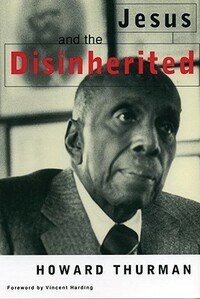Take a photo of a barcode or cover
emotional
hopeful
informative
inspiring
reflective
fast-paced
A must read for better understanding the basis for many social justice movements.
challenging
reflective
slow-paced
A heady theological exploration of how the message of Jesus relates to the poor and oppressed. There are some good moments, but I also had a hard time getting through it.
challenging
emotional
hopeful
inspiring
reflective
medium-paced
Wonderful. Short. I am very certain I only got a small percentage of what is available in this work even though it is very accessible.
There aren't too many books written in the 1930s that can still speak to us so vividly now. This tiny book is dense and you will have to go slow with it, because there is so much content. Howard Thurman was was a pacifist who visited with Ghandi and became a mentor to Dr. Martin Luther King, Jr. MLK traveled with this book and read it many times. It was interesting just to see what had such a big influence in his life. Part of what makes it so timeless is Thurman's evaluation of Christianity from a Black man's perspective, and it differs from traditional White American Christianity's interpretations of Jesus. Thurman's interpretation feels right and true because Jesus was a poor Jew under Roman occupation, he was the disinherited in his time.
challenging
informative
reflective
medium-paced
Read as background for up-coming group discussion that will focus on the theology that informed the US Civil Rights movement of the 1950s and 1960s.
"The basic fact is that Christianity as it was born in the mind of this Jewish teacher and thinker appears as a technique of survival for the oppressed. That it became, through the intervening years, a religion of the powerful and the dominant, used sometimes as an instrument of oppression, must not tempt us into believing that it was thus in the mind and life of Jesus.... Wherever his spirit appears, the oppressed gather fresh courage; for he announced the good news that fear, hypocrisy, and hatred, the three hounds of hell that track the trail of the disinherited, need no dominion over them."
"The basic fact is that Christianity as it was born in the mind of this Jewish teacher and thinker appears as a technique of survival for the oppressed. That it became, through the intervening years, a religion of the powerful and the dominant, used sometimes as an instrument of oppression, must not tempt us into believing that it was thus in the mind and life of Jesus.... Wherever his spirit appears, the oppressed gather fresh courage; for he announced the good news that fear, hypocrisy, and hatred, the three hounds of hell that track the trail of the disinherited, need no dominion over them."
Chapter 4:
"Jesus was a member of a minority group in the midst of a larger, dominant and controlling group."
"If a man knows precisely what he can do to you, or what other epithet he can hurl against you to make you lose your temper, your equilibrium, then he can always keep you under subjection. It is a man's reaction to things that determines their ability to exercise power over him."
Chapter 8:
"In the one place in which normal, free contacts might be most naturally established, in which the relations of the individual to his God should take priority over conditions of class, race, power, status, wealth or the like, this place is one of the chief instruments for guaranteeing barriers." (Speaking of the church.)
"...according to the law she should be stoned to death. 'What is your judgment?' was there searching question. To them the woman is not a woman, or even a person, but an adulteress, stripped of her dignity and worth."
"He met the woman where she was and he treated her as if she were already where she now willed to be. In dealing with her he believed her into the fulfillment of her possibilities. He stirred her confidence into activity. He placed a crown over her head which for the rest of her life she would keep growing tall enough to wear."
"
"Jesus was a member of a minority group in the midst of a larger, dominant and controlling group."
"If a man knows precisely what he can do to you, or what other epithet he can hurl against you to make you lose your temper, your equilibrium, then he can always keep you under subjection. It is a man's reaction to things that determines their ability to exercise power over him."
Chapter 8:
"In the one place in which normal, free contacts might be most naturally established, in which the relations of the individual to his God should take priority over conditions of class, race, power, status, wealth or the like, this place is one of the chief instruments for guaranteeing barriers." (Speaking of the church.)
"...according to the law she should be stoned to death. 'What is your judgment?' was there searching question. To them the woman is not a woman, or even a person, but an adulteress, stripped of her dignity and worth."
"He met the woman where she was and he treated her as if she were already where she now willed to be. In dealing with her he believed her into the fulfillment of her possibilities. He stirred her confidence into activity. He placed a crown over her head which for the rest of her life she would keep growing tall enough to wear."
"






